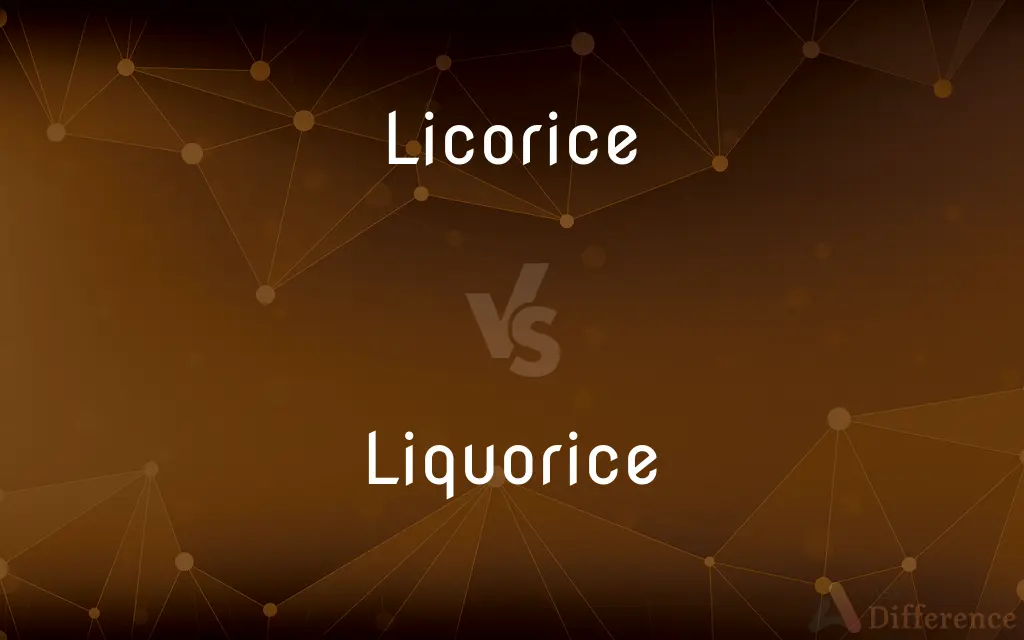Licorice vs. Liquorice — What's the Difference?
By Fiza Rafique & Maham Liaqat — Updated on April 8, 2024
Licorice refers to a sweet, dark substance from the Glycyrrhiza glabra plant, widely used in candies and medicine in American English, while liquorice is the British English spelling for the same substance.

Difference Between Licorice and Liquorice
Table of Contents
ADVERTISEMENT
Key Differences
Licorice, in American English, signifies a sweet, aromatic extract derived from the roots of the Glycyrrhiza glabra plant, utilized extensively in confectionery, flavoring, and herbal remedies. On the other hand, liquorice is simply the British English variant of the same term, with no difference in meaning or usage beyond the geographical variation in spelling.
The production and use of licorice/liquorice involve extracting the sweet-tasting compound glycyrrhizin from the plant's roots. This process does not differ between regions; rather, the spelling variation reflects the broader differences between American and British English. While "licorice" is commonly seen on product labels and in literature in the United States, "liquorice" is used in the United Kingdom, Australia, and other Commonwealth countries.
In culinary applications, licorice is famed for its distinctive flavor, which is both sweet and slightly bitter. This flavor profile is consistent across cultures, whether referred to as licorice in American confections or liquorice in British sweets, such as liquorice allsorts, a popular candy assortment.
Beyond its culinary use, licorice/liquorice plays a significant role in traditional and modern medicine. It's employed for its therapeutic properties, such as soothing sore throats and gastrointestinal issues, with no distinction in its medical application between the American and British contexts.
The preference for "licorice" or "liquorice" spelling extends into legal and regulatory documents, scientific literature, and marketing materials, aligning with the general linguistic practices of the respective countries. This adherence underscores the importance of regional spelling conventions in global communication.
ADVERTISEMENT
Comparison Chart
Spelling
Licorice
Liquorice
Usage
American English
British English
Meaning
Sweet substance from Glycyrrhiza glabra roots
Same as licorice, different spelling
Culinary Applications
Used in candies, beverages, and medicinal products
Identical uses, including sweets and herbal remedies
Medical Use
Treats sore throat, GI issues, and more
Same medicinal properties and uses
Cultural Significance
Found in American confections
Featured in British sweets like liquorice allsorts
Regulatory References
Spelled as "licorice" in US regulations
Spelled as "liquorice" in UK regulations
Compare with Definitions
Licorice
Used in traditional medicine for its healing properties.
Licorice tea is a popular remedy for coughs.
Liquorice
British spelling for a sweet, dark extract used in candies.
Liquorice allsorts are a favorite UK sweet.
Licorice
Employed as a flavoring agent in food and beverages.
Licorice flavor is used in some brands of root beer.
Liquorice
Appears in UK-regulated products and literature.
Liquorice is listed as an ingredient in some throat lozenges.
Licorice
Acts as an ingredient in some herbal remedies.
Licorice root is included in many digestive aids.
Liquorice
Used medicinally in herbal teas and remedies.
A cup of liquorice tea can soothe an upset stomach.
Licorice
A sweet extract from the root of Glycyrrhiza glabra.
Licorice is often added to candy for flavor.
Liquorice
Featured in British confectionery items.
Liquorice is a key ingredient in many British licorice candies.
Licorice
Found in various confections in the US.
Licorice twists are a classic American candy.
Liquorice
Culturally significant in the UK and Commonwealth.
Liquorice festivals celebrate this beloved flavor in some parts of the UK.
Licorice
A Mediterranean perennial plant (Glycyrrhiza glabra) of the pea family, having blue flowers, pinnately compound leaves, and a sweet, distinctively flavored root.
Liquorice
Liquorice (British English) or licorice (American English) ( LIK-ər-is(h), ) is the common name of Glycyrrhiza glabra, a flowering plant of the bean family Fabaceae, from the root of which a sweet, aromatic flavouring can be extracted. The liquorice plant is a herbaceous perennial legume native to Western Asia, North Africa and southern Europe.
Licorice
The root of this plant, used as a flavoring in candy, liqueurs, tobacco, and medicines.
Liquorice
A sweet, chewy, aromatic black substance made by evaporation from the juice of a root and used as a sweet and in medicine.
Licorice
Any of various similar plants.
Liquorice
The widely distributed plant of the pea family from which liquorice is obtained.
Licorice
A confection made from or flavored with the licorice root.
Liquorice
Variant of licorice.
Licorice
A chewy confection made from sugar and corn syrup with the addition of various flavorings, often manufactured in long flexible tubes.
Liquorice
Standard spelling of from2=Ireland
Licorice
(countable) The plant Glycyrrhiza glabra, or sometimes in North America, the related American Licorice plant Glycyrrhiza lepidota.
Liquorice
See Licorice.
Licorice
(uncountable) A type of candy made from that plant's dried root or its extract.
Liquorice
Deep-rooted coarse-textured plant native to the Mediterranean region having blue flowers and pinnately compound leaves; widely cultivated in Europe for its long thick sweet roots
Licorice
A black colour, named after the licorice.
Liquorice
A black candy flavored with the dried root of the licorice plant
Licorice
A flavouring agent made from dried root portions of the aforementioned plant.
Licorice
A plant of the genus Glycyrrhiza (Glycyrrhiza glabra), the root of which abounds with a sweet juice, and is much used in demulcent compositions.
Licorice
The inspissated juice of licorice root, used as a confection and for medicinal purposes.
Licorice
Deep-rooted coarse-textured plant native to the Mediterranean region having blue flowers and pinnately compound leaves; widely cultivated in Europe for its long thick sweet roots
Licorice
A black candy flavored with the dried root of the licorice plant
Common Curiosities
Is there any flavor difference between licorice and liquorice?
No, the flavor is the same; the difference is purely in spelling.
Can I use licorice in place of liquorice in recipes?
Yes, they are the same substance, so they can be used interchangeably.
Is licorice healthy?
Licorice has health benefits, such as soothing gastrointestinal issues, but should be consumed in moderation due to potential side effects from glycyrrhizin.
Can licorice be grown at home?
Yes, Glycyrrhiza glabra can be grown in suitable climates, allowing for the extraction of licorice at home.
Is there a difference in medicinal effectiveness between licorice and liquorice?
No, they have the same medicinal properties regardless of the spelling.
Are licorice candies made from real licorice?
Some are, especially those that list licorice extract as an ingredient, but many use anise oil for a similar flavor.
Are there any allergies associated with licorice?
Allergies to licorice are rare but possible and can cause reactions in sensitive individuals.
Why are there two spellings for licorice?
The spelling varies between American English (licorice) and British English (liquorice) due to regional linguistic conventions.
What are the main uses of licorice?
Culinary, medicinal, and as a flavoring agent in food and beverages.
Why do some people dislike the taste of licorice?
The unique flavor profile of licorice, which is both sweet and slightly bitter, may not appeal to everyone's palate.
How do manufacturers extract licorice?
The sweet flavor is extracted from the roots of the Glycyrrhiza glabra plant through a boiling and evaporation process.
How should licorice be stored for longevity?
Licorice root should be stored in a cool, dry place, while candy should be kept sealed to prevent staleness.
Can licorice affect blood pressure?
Yes, excessive consumption of licorice can lead to elevated blood pressure due to glycyrrhizin.
Is licorice used in any beverages?
Yes, licorice is used in some herbal teas and is a component of certain alcoholic beverages.
Does the spelling of licorice/liquorice affect its marketability?
Spelling can affect branding and marketability depending on the target region's linguistic preferences.
Share Your Discovery

Previous Comparison
Joke vs. Humour
Next Comparison
Sense vs. FeelingAuthor Spotlight
Written by
Fiza RafiqueFiza Rafique is a skilled content writer at AskDifference.com, where she meticulously refines and enhances written pieces. Drawing from her vast editorial expertise, Fiza ensures clarity, accuracy, and precision in every article. Passionate about language, she continually seeks to elevate the quality of content for readers worldwide.
Co-written by
Maham Liaqat













































